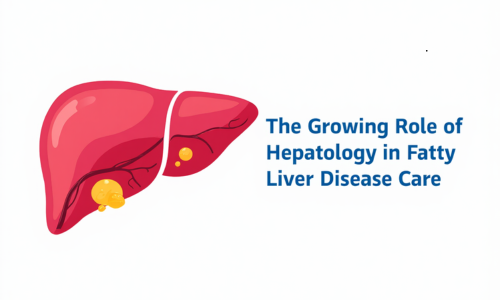Fatty liver disease is becoming one of the most common liver conditions worldwide, largely due to lifestyle changes and rising obesity rates. This condition can progress silently without obvious symptoms, making early detection and management critical. Here’s where hepatology, the branch of medicine dedicated to liver health, plays a vital role. Hepatologists are not only diagnosing fatty liver disease earlier but also guiding patients with treatment strategies, lifestyle advice, and advanced medical care to prevent complications.
Understanding Fatty Liver Disease
Fatty liver disease occurs when excess fat builds up in liver cells. There are two main types:
-
Alcoholic Fatty Liver Disease (AFLD): Linked to heavy alcohol consumption.
-
Non-Alcoholic Fatty Liver Disease (NAFLD): Often associated with obesity, diabetes, and high cholesterol.
If left unmanaged, fatty liver can progress to inflammation (steatohepatitis), fibrosis, cirrhosis, and even liver cancer.
Why Hepatology Matters in Fatty Liver Care
Hepatology bridges the gap between early detection and long-term management. A hepatologist provides:
-
Accurate Diagnosis → through blood tests, imaging, and sometimes liver biopsy.
-
Risk Assessment → identifying patients at higher risk of progression.
-
Personalized Treatment → lifestyle guidance, medications, or interventional therapies.
-
Long-Term Monitoring → ensuring the disease doesn’t silently advance.
The Role of Hepatologists in Patient Care
1. Early Detection and Screening
Fatty liver disease is often silent. Hepatologists use advanced imaging and non-invasive tests to catch it before damage becomes irreversible.
2. Lifestyle and Nutritional Guidance
Dietary changes, weight management, and exercise are essential. Hepatologists work closely with nutritionists to create sustainable plans.
3. Managing Associated Conditions
Patients with fatty liver often also face diabetes, high blood pressure, or heart disease. Hepatology integrates care for overall health improvement.
4. Preventing Progression
With regular monitoring and tailored interventions, hepatologists help prevent fatty liver from progressing into cirrhosis or liver cancer.
5. Advanced Treatment Options
For severe cases, hepatology provides access to advanced therapies, clinical trials, and when necessary, prepares patients for liver transplant evaluation.
Lifestyle Choices Guided by Hepatology
-
Balanced Diet: Focus on whole foods, vegetables, lean proteins, and reduced sugar.
-
Regular Exercise: 30 minutes of moderate activity daily supports liver function.
-
Avoid Excess Alcohol: Even mild intake can worsen fatty liver.
-
Medication Review: Some drugs impact liver health—hepatologists advise safe alternatives.
Future of Hepatology in Fatty Liver Disease
The field of hepatology is rapidly evolving. With advancements in non-invasive diagnostics, targeted therapies, and personalized medicine, the outlook for fatty liver disease patients is improving. Early integration of hepatology care is set to redefine how we prevent and manage this widespread condition.
FAQs
Q1: Can fatty liver disease be reversed?
👉 Yes, in many cases, especially if detected early and managed with proper lifestyle changes guided by a hepatologist.
Q2: When should I see a hepatologist for fatty liver?
👉 If you have risk factors like obesity, diabetes, high cholesterol, or unexplained liver enzyme changes, it’s wise to consult a specialist.
Q3: Do all patients with fatty liver need medication?
👉 Not always. Many can manage the condition through diet, exercise, and weight loss. Medication may be required in advanced cases.
Q4: How does hepatology differ from general medicine in liver care?
👉 Hepatology focuses exclusively on liver health, offering specialized tests, treatments, and long-term management strategies.
Q5: Can fatty liver disease lead to liver transplant?
👉 Yes, if it progresses to advanced cirrhosis or liver failure. This is why early hepatology intervention is critical.
Conclusion
Fatty liver disease is a growing global health concern, but with timely care, it doesn’t have to lead to severe complications. Through early detection, lifestyle guidance, and advanced treatment options, hepatology is becoming the cornerstone of effective fatty liver disease care. Consulting a hepatology specialist ensures that patients receive expert support from diagnosis to long-term management, protecting liver health for the future.

